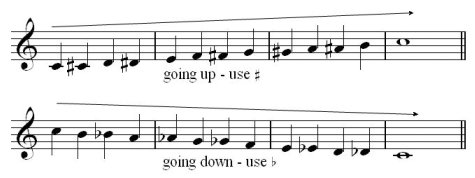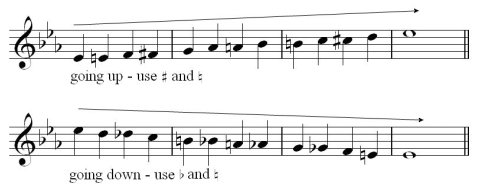
Chromatic Scales
chromatic scales - blues scale - pentatonic scale
half steps (semi tones)
Chromatic Scales are series of 12 consecutive notes, each a half step (or semitone) apart. So on the piano keyboard it uses all of the white and black keys of the musical alphabet.
This scale can start on any note as long as it moves only by half steps. Here is an example starting on the note C.
Going up, or ascending:
C - C# - D - D# - E - F - F# - G - G# - A - A# - B - C
Going down, or descending:
C - B - Bb - A - Ab - G - Gb - F - E - Eb - D - Db - C
This is what it looks like on the musical staff:

The diagram above uses sharps when ascending and flats when descending.
This is a VERY GENERAL rule with MANY exceptions: when the chromatic notes move up, sharps are used... and when the chromatic notes move down, flats are used.
Below is a diagram of a chromatic scale that starts on E flat:

This example has a couple of new things it it. There is a Key Signature (key of Eb) at the beginning of the staff. Go to Key Signatures for a closer look at key signatures.
In addition to sharps and flats, this E flat chromatic scale has some natural signs in it. The natural looks like the figure at the left.
The natural sign cancels any sharp or flat that is in the same measure. Normally when there is a sharp or flat in a measure of music, it lasts for the entire measure, i.e. if that same note appears again in that measure, it will still be a sharp (or flat.) The natural cancels that rule.
On a piano keyboard this means that it is a white key. For any other instrument this means it is not a sharp or flat - it's a NATURAL!
Alfred's "Complete Book of Scales, Chords, Arpeggios and Cadences" includes ALL the scales, primary chords and music fundamentals. Here's a book that will last years.
Click here to GO BACK TO SCALES.
THE COMPLETE
ONLINE BUSINESS BUILDER
SBI
Hi and Welcome!
Fill out the form below to sign up for the free periodic
Player's Guide Newsletter!
Get tips and ideas about substitute chords, chord progressions and harmonic movement.
What's this???






New! Comments
Please leave me a comment in the box below.